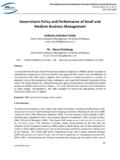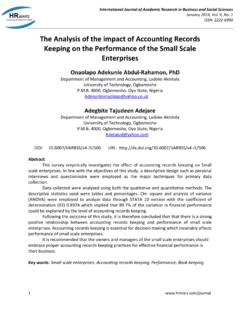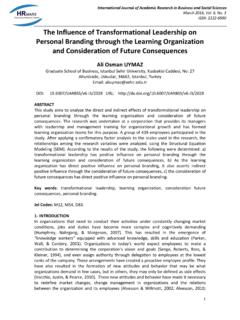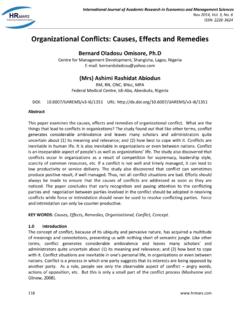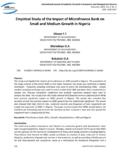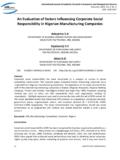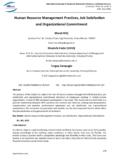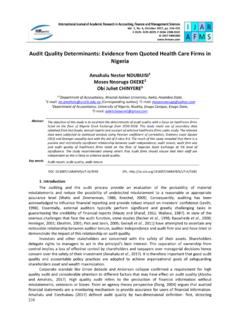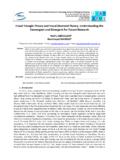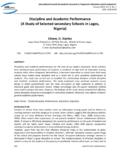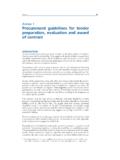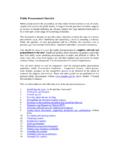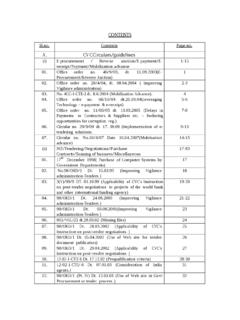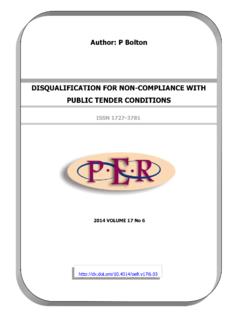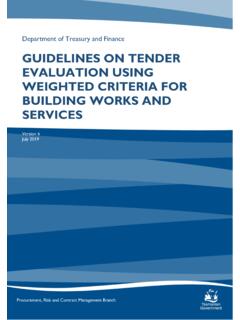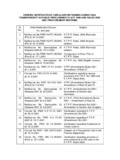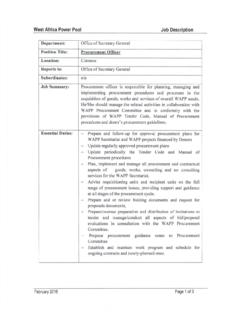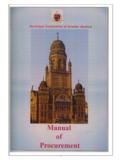Transcription of Assessment of Public Procurement Policy …
1 International Journal of Academic Research in Business and Social Sciences October 2014, Vol. 4, No. 10. ISSN: 2222-6990. Assessment of Public Procurement Policy Implementation in the Educational Sector (A Case Study of Takoradi Polytechnic). Lawrence Y. Kusi Senior Research Assistant Department of Management Studies,School Of Business University of Cape Coast, Ghana, Email: George A. B. Aggrey Procurement Section Ghana Education Service Ahanta West Email: Kwamena M. Nyarku Lecturer/Consultant Department of Management Studies, School f Business University of Cape Coast, Ghana Cell Numbers: +233 541750910 / 206376263. Email: DOI: URL: Abstract Public Procurement Act 663 of 2003 has experienced a number of reviews and amendments since independence and have mostly been characterised by huge contractual payment arrears, corruption, delay in delivery of contracts, unsustainable foreign debts and excessive budget deficits.
2 To address these and many other challenges, the Ghana Public Procurement Act 663. (2003) was promulgated and assented on 31st December, 2003. Ten years down the line, compliance has become a major challenge in the implementation of the Act among Public institutions in Ghana. This precipitated the conduct of this study to find out whether Takoradi Polytechnic fully complies with the provisions of the Act, and if so, are there any challenges that inhibit the smooth implementation of Procurement activities. Subject to the nature of the population and the field of study, descriptive survey design was adopted for the study with questionnaires and semi-structured interview as the main data collection instruments. The findings of the study proved that Takoradi Polytechnic uses the Ghana Public Procurement 2003 (Act 663) in its Procurement of goods, works and services from suppliers through the established Procurement Unit of the Institution.
3 However there are some major challenges such as excessive bureaucracy, cumbersome documentation processing, inadequate storage facilities and others and it is incumbent on the Public Procurement Authority to intervene to curtail 260. International Journal of Academic Research in Business and Social Sciences October 2014, Vol. 4, No. 10. ISSN: 2222-6990. some of the challenges even as the Polytechnic performs certain internal interventions to counter such challenges in the Procurement cycle. Key words: Procurement , Procurement Cycle, Ghana Public Procurement Act, Compliance, E- Procurement M11. Introduction Procurement is essential for the development of economies and as a result governments, Policy makers, business practitioners and academia are giving it much attention than ever. Procurement budgets in developing countries account for about 20 per cent of government expenditure globally (Mlinga, 2009).
4 Many governments have embarked on reforms in their Procurement systems to streamline and harmonise legal and institutional framework. In Ghana, Public Procurement represents about 24% of total imports and apart from personal emoluments, Public Procurement represents 50 -70% of the national budget and 14% of Gross Domestic Product (Adjei, 2006). Studies indicate that the annual value of Public Procurement for goods, works, and consultancy services was about US$600 million (World Bank, 2003) which represented about 14 per cent of Ghana's (GDP). The bulk of the expenditure were programmes run by Ministries, Departments, Agencies (MDAs) and District Assemblies (DAs) as well as Public Hospitals, Universities, Schools and Colleges which involve Procurement of works, goods technical and consultancy services. Ghana's Public Procurement is a major activity of government that generates important financial resources.
5 Public Procurement is the process by which governments and other Public -funded entities acquire goods, works and services needed to implement Public projects. It accounts for at least 15% of World's Gross Domestic Product (GDP) and even more in African Countries (World Bank Report, February 4th, 2013). Public Procurement is an integral function of governments in both developed and developing countries as the gigantic financial outflows has a great impact on their economies that needs prudent management (Thai, 2001). Thus prudent handling of Public Procurement functions is fundamental to achieving economic, socio-political and other government objectives. Upon all the benefits Ghana gain through Procurement ; the state is still challenged in so many ways. To operationalise the concept of good governance and to push towards zero tolerance . of corrupt practices, the Public Procurement Act, 2003 (Act 663) was enacted by the government of Ghana to address the real and perceived weaknesses in the Public Procurement of goods, works and services.
6 The main objective of passing the Procurement Act (Act. 663) in 2003 is eliminating corruption in the Procurement process, regulating expenditure and also instilling discipline in Public finances. ( Public Procurement Authority: Electronic Bulletin, 2011). The Public Procurement Authority (PPA) is mandated by Sections 3(d), 3(e) and 3(h) of the Public Procurement Act, 2003 (ACT 663) to assess the performance of each entity to ensure compliance with the provisions of Act 663. 261. International Journal of Academic Research in Business and Social Sciences October 2014, Vol. 4, No. 10. ISSN: 2222-6990. Brief History of Procurement Laws in Ghana Before the Public Financial Management Reform Programme commenced in 1996 in Ghana, Procurement was guided by many different rules. Government officials struggled to identify which rules to follow, due to lack of existing Policy framework for Public Procurement , lack of existing institutional arrangement, and the absence of a Central Body for Procurement (Suleiman, 2010).
7 In 1999, the Public Procurement Oversight Group was formed to design and coordinate the reform as well as oversee the improvement of the country's Public financial health. The absence of a comprehensive Public Procurement Policy and poor comprehensive legal regime to safeguard the integrity of the Public Procurement system were identified as some shortcomings and organisational weaknesses in the country's Procurement system. In 2003, the Government of Ghana put together the main Public Procurement guidelines currently used in Ghana and enacted these guidelines to fight against and overcome the shortcomings. This Act was implemented to replace the many different rules that guided Procurement activities. The act provided a comprehensive framework for developing and strengthening Procurement institutions and operational processes in the context of poverty reduction, private sector development, good governance and anti-corruption.
8 The Public Procurement Authority in its effort to make Public Procurement transparent, efficient, and fair, established five basic pillars of the Public Procurement - comprehensive transparent legal and institutional framework; clear and standardised Procurement procedures and standard tender documents; independent control system; proficient Procurement staff;. and anti-corruption measures. The legal and institutional framework stipulated that the Public Procurement Authority established the Public Procurement Board as a legal corporate entity. This entity comprised of ministries, departments agencies and all para-statal establishments that utilised Public funds. In each entity, a tender committee was charged of providing a one- stop shop for concurrent approvals, awards and management of contracts. This study was conducted to assess the level of compliance in the implementation of the Public Procurement Policy (Act 663) of 2003 by Takoradi Polytechnic, examine the challenges faced by the Institution during its implementation, and also assess measures put in place to ensure effective compliance of the act, including making recommendations.
9 Literature Review and Conceptual Framework Procurement is the process of obtaining goods or services in any way, including borrowing, leasing and even force of pillage (Lysons & Farrington, 2006). Procurement is the process of acquiring goods, works and services, covering both acquisitions from third parties. It involves option appraisal and the critical make or buy decision which may result in the provision of goods and services in appropriate circumstances (PPB, 2003 ). According to Ghana Integrity Initiative (2007), Public Procurement is the acquisition of goods and services at the best possible total cost of ownership, in the right quantity and quality, at the right time, in the right place for the direct benefit or use of governments, corporations, or individuals, generally via a contract. In Ghana, Public Procurement is estimated at 50-70% of government's expenditure ( Public Procurement Authority: Electronic Bulletin, 2011).
10 262. International Journal of Academic Research in Business and Social Sciences October 2014, Vol. 4, No. 10. ISSN: 2222-6990. Procurement process is a cycle or chain that shows the activities that Procurement goes through in obtaining a given need for operational and strategic purpose. Wan Lu (2007) argued that process consisted of flow chart and blue print to describe a process in pictures using symbols with arrow lines connecting each operational step. Emmett and Crocker (2008) also argued that the traditional Procurement model for most sectors is represented in Figure 1. Figure 1: Procurement Process Model Source: Emmert and Crocket 2008. Public sector Procurement process has a similar phase which starts with the identification of operational requirements that are determined and specified by the user and subsequently consolidated as a composite requirement for the Procurement of annual Procurement plan which according to the Procurement Act, is mandatory for every Public sector institution to have.
